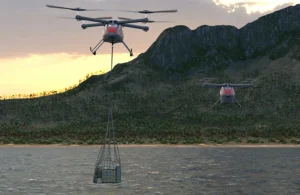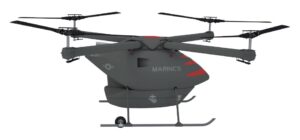Kaman Corp. [KAMN] said on Oct. 10 that it was chosen to build a prototype logistics Unmanned Aerial System (UAS) for the Marine Corps based on its commercial KARGO UAV model.
The company said the KARGO UAV is a “purpose-built autonomous medium-lift logistics vehicle” that can carry up to an 800-pound payload and is designed to operate in austere environments.

The company said after the prototype is built it will conduct a Field User Capability Assessment in an operationally-relevant austere environment.
This logistics UAS project is being managed by Naval Air Systems Command’s Navy and Marine Corps Small Tactical Unmanned Aircraft Systems program office, PMA-263, via its Medium Unmanned Logistics Systems – Air (MULS-A) program.
Kaman said it started developing the KARGO UAV in 2021 and previously flew a scaled demonstration aircraft in fall 2021 to prove the concept. Currently, a full-scale KARGO demonstrator is under construction, with the first flight scheduled for later this year.
The aircraft, as conceived on the company website, appears to be the size of a small helicopter with four rotors and no tail. Kaman said it estimates the KARGO to have a range upward of 500 nautical miles, depending on payload weight, while traveling at a speed of up to 121 knots and able to operate at over 10,000 feet.
The KARGO is expected to be 24.4 feet by 24.4 feet when rotors are extended and be 7.5 feet tall. It weighs 1,340 pounds when empty of cargo. The company’s product website said with only external fuel it can operate up to 523 nautical miles, with a 200-pound payload can go out to 390 nautical miles, with a 300-pound payload operate to 326 nautical miles and with a 600-pound payload travel out to 143 nautical miles.

The UAV is being designed to have an optional conformal supply pod and transport supplies via standard slingload. The company also designed KARGO with a compact form to fit into a standard CONEX shipping container and said it can be unloaded and operated by only two people.
The company noted Near Earth Autonomy, based in Pittsburgh, Pa., was chosen as the aircraft autonomy provider, with parallel testing ongoing for the autonomy systems that will be used on the service’s prototype.
“We have been tracking the need for expeditionary logistics for some time. And we are thrilled to see our focused R&D efforts to provide an affordable, reliable, and maintainable logistics vehicle come into alignment with such an important program as MULS-A,” Carroll Lane, president of Kaman’s Precision Products segment, said in a statement.